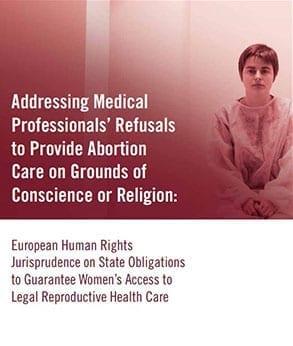Dáil Approves Ireland Abortion Legislation Only For Women Whose Lives Are At Risk
Protection of Life During Pregnancy Bill 2013 Goes to the Seanad For Final Vote, Legislation Fails to Expand Access to Safe and Legal Abortion
(PRESS RELEASE) After a contentious debate, the Dáil (House of Representatives) passed the Protection of Life During Pregnancy Bill 2013 in a 127 to 31 vote. The abortion legislation is designed to provide doctors and individuals legal clarity about the circumstances under which a woman whose life is at risk may legally end a pregnancy. The act now goes to the Seanad (Senate) for review and final vote, before going to Ireland President Michael D. Higgins’s desk. While the Center for Reproductive Rights commends the Irish government for taking steps to clarify the circumstances under which abortion is legal in Ireland, there is still much to be done to fulfill women’s fundamental human rights to health and reproductive autonomy. Said Lilian Sepúlveda, director of the Global Legal Program at the Center for Reproductive Rights: “Ireland is taking an important step towards clarifying the criteria for legal abortion. However, the Dáil kept the law extremely narrow in scope. “As currently written, Ireland’s abortion law will do nothing to help women who seek to end their pregnancies for many other reasons besides a threat to their lives. This includes women who are pregnant due to rape or incest, who are carrying fetuses with severe impairments, and who face other serious risks to their health. “Essential reproductive health care is a fundamental human right. We hope the Seanad will review the language in the act and take steps to expand women’s access to safe and legal abortion.” All 165 proposed amendments to the bill were defeated by the Irish government, including an amendment to refrain from imposing criminal penalties on women who obtain an illegal abortion. According to a recent Irish Times/Ipsos MRBI poll, 84 percent of Irish citizens believe that abortion should be available when a woman’s life is at risk. In the same poll, 79 percent of people believe that abortion should be permitted in cases where the fetus is not capable of surviving outside the womb and 78 percent of respondents said abortion should be allowed in cases of rape or incest. On paper, abortion has been legal in Ireland in exceptional circumstances since 1992 for women suffering from life-threatening diseases, including ectopic pregnancy, and in cases where a woman is at risk of suicide. But an absence of regulations on the procedure has made abortion virtually impossible to access, even under these narrow circumstances. This has led women to seek abortions outside of the country or—for women who are unable to travel abroad—to continue with their pregnancies, putting their health and lives at risk. The Protection of Life During Pregnancy Bill 2013 clarifies the conditions for legal abortion, as called for by the European Court of Human Rights in a 2010 judgment. A draft of the bill was published on June 12 and an outline of the bill was published on April 30. After ten weeks of deliberations, the Dáil has finally reached an agreement on the language in the bill. The legislation states that two doctors will have to confirm whether there is a physical threat to the life of the pregnant woman. In medical emergencies, one doctor will suffice to certify that a termination is justified. For pregnant women who are at risk of suicide, the bill sets forth that three doctors—an obstetrician and two psychiatrists—will have to verify their condition before they will be able to access an abortion. The so-called “suicide exception” has stirred much debate in Ireland, with some opponents of the bill suggesting outrageously that legislating for abortion for women at risk of suicide will “open the floodgates” to “abortion on demand.” The bill allows 25 hospitals in Ireland to perform legal abortions, but also allows the Minister of Health to suspend any of these hospitals from doing so if they are found to be breaking the law. The bill also allows medical staff to deny women abortions based on their personal and religious objections to the procedure. In those circumstances, the woman must be transferred to another medical provider. However, when there is an imminent danger to the life of the woman, medical staff must perform a legal abortion regardless of their personal or religious objections. The inclusion of provisions allowing reproductive health providers to deny women care based on personal and religious objections is troubling, especially since the bill does not provide for comprehensive regulation and oversight of this practice. As seen in many other countries, the mere obligation of an objector to transfer a woman to another provider is by no means sufficient to ensure that she will access lawful services and be treated speedily and with due respect for her rights and her dignity. Human rights bodies have repeatedly expressed concern over inadequate regulation of the practice of denying health care based on personal or religious objections. According to the bill, doctors who perform abortions outside of the narrow scope of the law, and women who undergo the procedure in these circumstances, are subject to prosecution and up to 14 years imprisonment. International standards are clear: criminalization of women having abortions violates human rights law. The exceptionally restrictive Irish abortion regime goes against well-established human rights standards and has been criticized by several international human rights bodies. In the 2010 European Court of Human Rights case A, B and C v. Ireland, the Center for Reproductive Rights argued that Ireland’s current abortion law is inconsistent with legal standards for abortion regulations in international human rights law and in comparison to other countries in Europe. The court ruled that Ireland’s ban on abortion violated the human rights of a woman who was unable to determine whether her cancer was sufficiently serious as to qualify her for a legal abortion in the country. It called on the state to make effective the right to legal abortion when a woman’s life is in danger.


